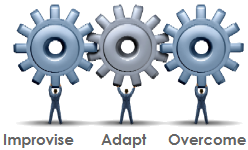21st Century Skills
I include the following sentence in my personal statement on Instructional Leadership:
| Acknowledging that today’s learners are different from previous cohorts, I accept the challenge to collaboratively prepare them for a future that, today, we cannot clearly describe. |
Many of the jobs that current high school students will have in 10 to 15 years do not yet exist. So, how do we prepare them for an unknown future? Increasingly, this generation of learners will have to face environmental challenges resulting from human activity. (For their sake, I hope that we finally learn not to crap in our own nest.)
 Some attributes sought after by employers are encapsulated as FATTTness — be flexible, adaptable, tolerant, tolerable and trustworthy. Co-opting a US Marines Corp slogan, future employers need problem solvers who can improvise short-term work-arounds when obstacles arise, adapt to longer-term changing environments and overcome challenges. In the language of Geert Hofstede, employers need people who are not uncertainty avoiding, preferring those who work well with uncertain, incomplete or conflicting information as they balance concern for people with concern for task.
Some attributes sought after by employers are encapsulated as FATTTness — be flexible, adaptable, tolerant, tolerable and trustworthy. Co-opting a US Marines Corp slogan, future employers need problem solvers who can improvise short-term work-arounds when obstacles arise, adapt to longer-term changing environments and overcome challenges. In the language of Geert Hofstede, employers need people who are not uncertainty avoiding, preferring those who work well with uncertain, incomplete or conflicting information as they balance concern for people with concern for task.
The following is also from my personal statement on Instructional Leadership:
| I believe we should build competencies — skills and knowledge of the curriculum — plus the positive attitudes, ethical behaviours and growth mindset to be successful in life. A lifelong learner, I see learning as bi-directional. Encouraging others to do so, I willingly share what I learn with others. Used correctly, I believe in the power of technology to magnify intellect. |
In Ontario, the educational system focuses attention primarily on curriculum. Yes, curriculum is important but, as technological innovations emerge and some jobs are automated out of existence, some of today’s knowledge and skills may become obsolete. This signals a need to shift towards trainability and away from static knowledge and skills updated every one or two decades.
So, the em-PHA-sis is on the wrong syll-ABLE?
Why not adopt this definition of competency — the knowledge and skills plus the positive attitudes, ethical behaviours and growth mindset to be successful in life? Sadly, knowledge and skills have pushed out much else.
So, embrace with vigour Hodinohso:ni` values and learning skills and work habits (Ontario Ministry of Education, 2010, p. 11) — learners taking responsibility, being organized, sometimes working independently or collaborating, taking initiative and self-regulating their behaviour. If you think about it, these are attributes that organizations are looking for in their employees.
So, I challenge Ontario educators: Go Beyond Curriculum. Build the positive attitudes, ethics, growth mindset, and learning skills and work habits of your students. Teach them to become lifelong learners and build a toolkit that enable them to succeed. Develop and nurture grit — perseverance and passion — to become tomorrows innovators, leaders and effective communicators. Help them develop gracious professionalism:
| Gracious Professionalism is a way of doing things that encourages high-quality work, emphasizing the value of others, and respecting individuals and the community. (First Robotics) |
Gracious professionalism is much more and, in many ways, encapsulates much of the above.
References
Ontario Ministry of Education. (2010). Growing Success. Accessed September 20, 2019 from http://www.edu.gov.on.ca/eng/policyfunding/growsuccess.pdf